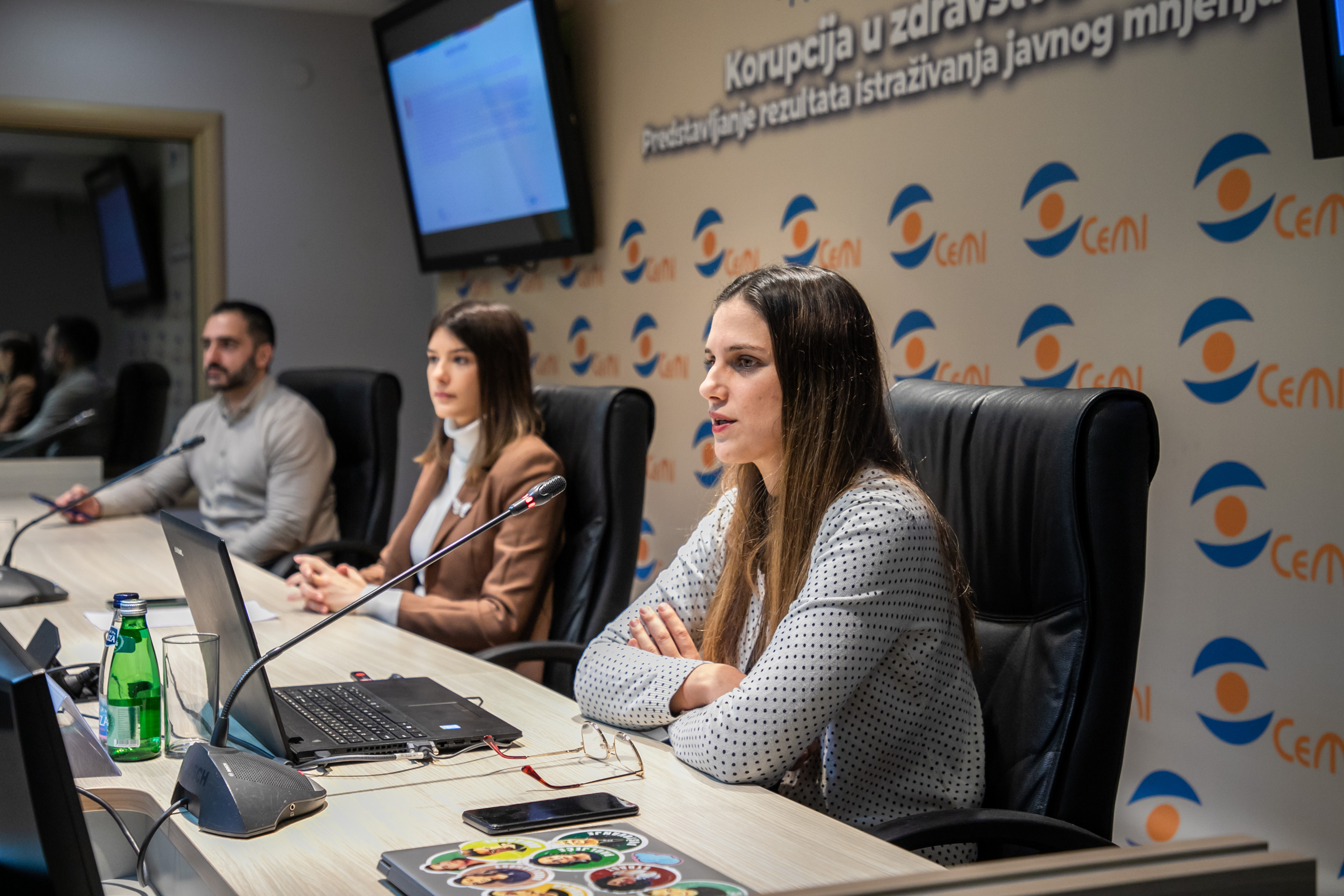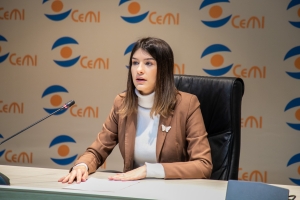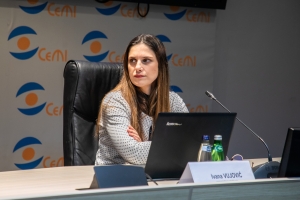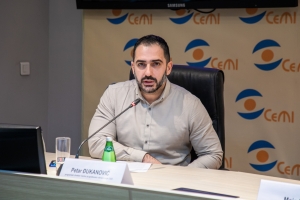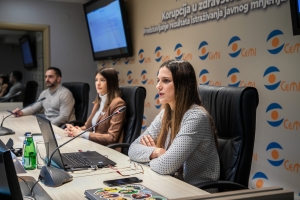In Montenegro, 58 percent of citizens believe that corruption is present in health care system, and they see the low salaries of healthcare workers, moral crisis, unsatisfactory legislation and the absence of strict internal control as the most common reasons for the existence of this phenomenon.
This was shown by a survey by the Center for Monitoring and Research (CeMI), which was conducted from November 1 to 15 this year on a sample of 1,004 respondents, as part of the " For a healthier health care system!" project.
Methodologist of the research, Ivana Vujović, said that 58 percent of citizens believe that corruption is present or is present to a large extent in the health care system, and only 9.1 percent of them believe that there is no corruption.
"There has been a significant change in attitude compared to the research we conducted in 2016 and 2013, and a significant increase of people who believe that corruption is present." "Previous surveys were conducted over the phone, and the last survey was conducted face-to-face, so we cannot say that there is complete comparability, but it is very indicative that there is a significant change," explained Vujović.
"According to the perception of public opinion, corruption is to the greatest extent present in the relationship between patient and doctor, when compared to the relationship between patient and nurse or technician and patient and employee in a medical institution, " stated Vujović.
"During the research, 4.6 percent of the respondents stated that during the previous year, their families had unofficially paid for a service at a health care institution once, in violation of the law, while four percent of them had paid for the service more than once," stated Vujović.
She pointed out that 86 percent of the respondents stated that they or their family members paid for the service, most often they gave money to surgeons, gynecologists, nurses and technicians, laboratory technicians, radiologists, anesthesiologists or fellow students and health care institutions, as well as the chosen doctor.
"As in previous years, surgeons are the ones who are most often mentioned that they were given money, expensive gifts or in some other way that they were paid for services against the law," Vujović added.
In the case of informal payment for services, as she added, the tariff was known in advance for 28.4 percent of respondents, which is the most frequently chosen answer from those offered.
"The specificity of this year's findings is that it is almost as common for respondents to state that they made an informal payment in a health facility before, during or after the intervention," Vujović said.
According to her, the motive for the payment is, according to the statements of the respondents who said that this kind of payment was made in the health service, the need to avoid waiting, to ensure better treatment, to get a certain comfort, to choose the right doctor or the necessary finding or opinion that provides early retirement.
"The majority, 73.4 percent of the respondents claim that they paid for the service with money, 17.2 percent of the respondents claim that they once honored a health worker even though it was not requested, and this percentage has decreased compared to previous surveys when it was 44 in 2013 percent and in 2016, when it amounted to 35 percent," stated Vujović.
She said that 22.5 percent of respondents stated that they were referred to a private health care institution by a doctor where they had to pay for an examination, even though they could have received a free examination at a health care institution.
"The reasons for the existence of corruption in health care system, according to the respondents, are the low salaries of health care workers, moral crisis, bad legislation and the absence of strict internal control," said Vujović.
She pointed out that a significant number of respondents do not know who to turn to to report corruption, while those who mention some of the institutions in the first place mentioned the police, the Agency for the Prevention of Corruption, the administration of a health institution, the Ministry of Health or the Prosecutor's Office.
"When it comes to the quality of health care, respondents state that they waited a worryingly long time for some specialist examinations, although the largest number of respondents who performed a specialist examination waited less than a month for the same." Only 16 percent of respondents state that they did not wait more than a week for a specialist examination, while 36 percent of those who had an examination with a specialist doctor for which they waited more than a month. "However, ten percent of respondents stated that they waited longer than three months for an examination with a specialist," said Vujović.
She said that almost half of the respondents, 49.4 percent of them, said that they wait a long time for an examination when they go to the doctor.
"An equal share of respondents, 49.4 percent, believes that waiting lists are long for certain health services." Among the respondents, there are 46 percent of those who believe that the quality of the provision of health services is the same as in the last two years and has not changed, and there is an almost equal percentage of those who believe that it has worsened or improved, and in both cases we are talking about a quarter of the respondents, stated Vujović.
She pointed out that respondents state that they are not sufficiently familiar with their rights in the field of health care.
"Only six percent of those surveyed declare that they are fully familiar, while a total of 33 percent declare that they are quite or completely familiar with this body of law. 27.8 percent of respondents estimate that they are little or not at all familiar with the rights they have as patients, which is an indicator of improvement in relation to the previous period," Vujović said.
She pointed out that it is worrisome that 52 percent of respondents do not know who to contact if patients' rights are violated, stating that, nevertheless, there is a positive trend compared to earlier research.
"43.5 percent of the respondents believe that during medical examinations, the privacy of patients is violated because uninvited persons sometimes enter the area where the doctor performs the examination. Almost the majority, 45.3 percent, assess that health services are not always available to them. Every seventh respondent believes that he cannot get them a health service whenever they need it," stated Vujović.
She said that almost half of respondents report that they occasionally, often or always have to pay for a medicine that is on the reimbursement list.
"Health care workers, the Ministry of Health, the media, and the defenders of patients' rights should be informed about patients' rights," concluded Vujović.
The project coordinator of CeMI, Maja Bjelić, recalled that this organization was the first to raise the issue of corruption in health care system, stating that this project represents a continuation of their earlier efforts in this area.
"The general goal of the project is to contribute to a greater level of equality in exercising the right to health care in Montenegro. The realization of this goal was contributed by the implementation of a series of activities with the aim of achieving several key results for improvement in the mentioned area," said Bjelić.
According to her, a comprehensive analysis of the system of providing health services and protecting patients' rights in Montenegro was conducted, based on which alternative models and policies will be proposed for improving the work of health care institutions and protecting patients' rights.
"Given the insufficient level of information among citizens about their rights, CeMI within the project, with a set of activities, contributes to increasing the awareness of citizens of Montenegro about their rights as patients, with special attention to anti-discrimination, protection of personal dignity and privacy, and the right to equal access to health care ", stated Bjelić.
She pointed out that informed citizens are empowered to directly report possible cases of corruption, through the available web and mobile application of CeMI for anonymous reports of corruption and irregularities in health care system.
"CeMI's legal team analyzes the received content and will act accordingly, informing the public and responsible institutions about the main issues depending on the nature of the reported cases. I would like to use this opportunity to invite citizens to report cases of corruption and violations of health rights through the Za zdravije zdravstvo application, which is available on iOS and Android devices, as well as on the website www.zazdravijezdravstvo.me," said Bjelić.
The program director of the Centre for Civic Education (CCE), Petar Đukanović, said that the project contributes to the improvement of health policies, especially in the part related to the prevention of corruption, in order for the system to function so that access to health services is equal for everyone.
"We believe that today's research will be important for decision-makers, as an evaluation of what has been done so far in the field of health, in order to carry out further reforms of this sector, which has been facing challenges for a long time to be fully functional and primarily oriented towards needs those for whom it exists, namely the citizens," said Đukanović.
He assessed that through the project, citizens are approached and facilitated in a way to react to cases of corruption or violations of patients' rights, in order to further process cases of inadequate access to health care and improve the system.
The research was carried out within the framework of the projects implemented by CeMI, in cooperation with the NGO Bonum, and which is supported through the program "CSOs in Montenegro - from basic services to policy shapers - M'BASE" implemented by the Centre for Civic Education (CCE), Friedrich Ebert Stiftung (FES), NGO Center for the Protection and Research of Birds (CZIP) and NGO Politikon Network (PIN) from Montenegro. The project is financed by the European Union and co-financed by the Ministry of Public Administration.
